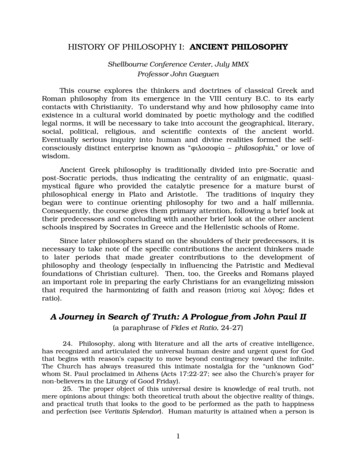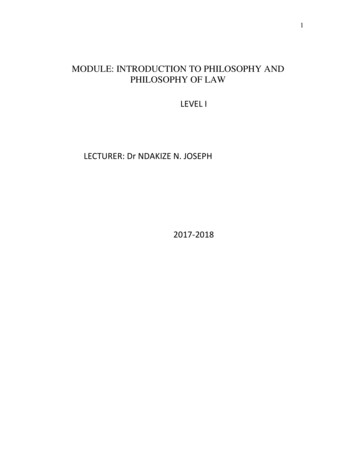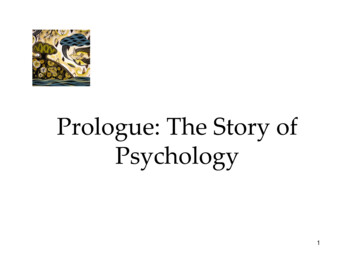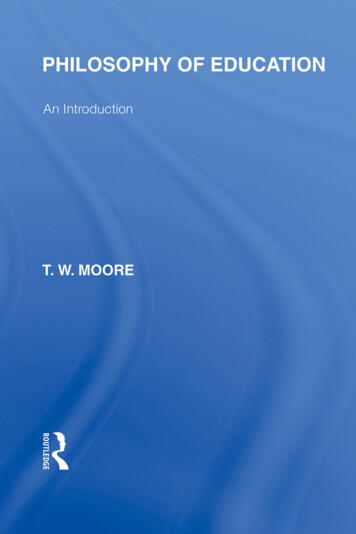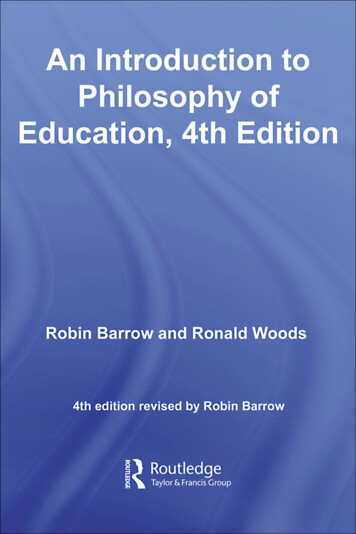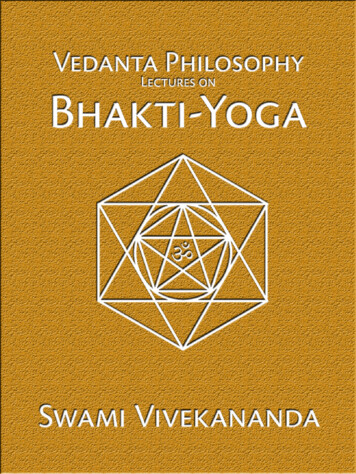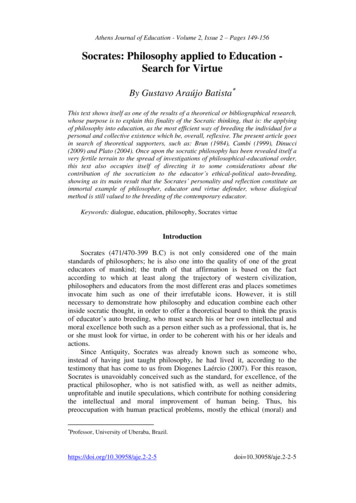
Transcription
Athens Journal of Education - Volume 2, Issue 2 – Pages 149-156Socrates: Philosophy applied to Education Search for VirtueBy Gustavo Araújo Batista This text shows itself as one of the results of a theoretical or bibliographical research,whose purpose is to explain this finality of the Socratic thinking, that is: the applyingof philosophy into education, as the most efficient way of breeding the individual for apersonal and collective existence which be, overall, reflexive. The present article goesin search of theoretical supporters, such as: Brun (1984), Cambi (1999), Dinucci(2009) and Plato (2004). Once upon the socratic philosophy has been revealed itself avery fertile terrain to the spread of investigations of philosophical-educational order,this text also occupies itself of directing it to some considerations about thecontribution of the socraticism to the educator’s ethical-political auto-breeding,showing as its main result that the Socrates’ personality and reflection constitute animmortal example of philosopher, educator and virtue defender, whose dialogicalmethod is still valued to the breeding of the contemporary educator.Keywords: dialogue, education, philosophy, Socrates virtueIntroductionSocrates (471/470-399 B.C) is not only considered one of the mainstandards of philosophers; he is also one into the quality of one of the greateducators of mankind; the truth of that affirmation is based on the factaccording to which at least along the trajectory of western civilization,philosophers and educators from the most different eras and places sometimesinvocate him such as one of their irrefutable icons. However, it is stillnecessary to demonstrate how philosophy and education combine each otherinside socratic thought, in order to offer a theoretical board to think the praxisof educator’s auto breeding, who must search his or her own intellectual andmoral excellence both such as a person either such as a professional, that is, heor she must look for virtue, in order to be coherent with his or her ideals andactions.Since Antiquity, Socrates was already known such as someone who,instead of having just taught philosophy, he had lived it, according to thetestimony that has come to us from Diogenes Laércio (2007). For this reason,Socrates is unavoidably conceived such as the standard, for excellence, of thepractical philosopher, who is not satisfied with, as well as neither admits,unprofitable and inutile speculations, which contribute for nothing consideringthe intellectual and moral improvement of human being. Thus, hispreoccupation with human practical problems, mostly the ethical (moral) and Professor, University of Uberaba, Brazil.https://doi.org/10.30958/aje.2-2-5doi 10.30958/aje.2-2-5
Vol. 2, No. 2Batista: Socrates: Philosophy applied to Education – Search for Virtuepolitic (civic) ones, made of his reflection one of the main water divisors in theambit of the history of philosophy as well as in the ambit of the history ofeducation.The reason for which here one defends Socrates as an innovator, both inphilosophy and in education, it is based on his peculiar investigation method:"ελενκο ", that is, refutation, which consists in a dialogue whose questions andanswers concerning determined theme, at the end of that one should fatallymake option for rejection of some thesis or affirmation, after being found itslogic inconsistence or incoherence. This method, essentially dialogical,remains valid until today to philosophers and educators, who bet that, onlystarting from a dialogical perspective, one will be able to reach agreement,indispensable element to consolidation both to philosophical thought in generaleither to educational practice in particular, reason by which this text advocatesthe importance of knowledge about socratic thought as a philosophicalfundament to educator’s breeding.The Process of Creation of Socratic Philosophy and PedagogyIt is surely unknown when, how and why Socrates has become aphilosopher; there are both anecdotes either serious affirmations regarding thereasons that would have driven him to make philosophy his life work.Moreover, it is very complicated to admit the historicity of his person, despitehis unquestionable importance to the history of western philosophical andpedagogical thought; according to the testimony of Professor Jean Brun.Socrates’ person puts to the philosopher a quite strange problem but fullof sense: all the history of Greek philosophy is traditionally organizedaround his name and we do not know who Socrates really was, there is nohistory of Greek thought but in function of Socrates’ character and historydoes not allow us to make of him a historic character. (Brun, 1984, p. 9;our English version)Howsoever, the fact is that, starting from him, the philosophical activityhas been extended to the ambit of questions typically human, especially thoseones of ethical-political order. Although Socrates has not left behind himanything written of his own fist, his thought has been passed centuries and hascome to present days, both because of his followers, such as Plato1 (428/71Plato is, without shadow of doubt, the historic character who explored Socrates on the bestway, both to describe him on his person and/or only to express his own thought, either tomake of him the main issuing of his own ideas. His wide work, almost composed ofdialogues, allows to affirm that: "There is not almost a platonic dialogue into which Socratesdoes not figure, in the most part he is who conducts the discussion and the interlocutors arealways fully beated by his argumentation and irony. Works such as Apology of Socrates,Criton and Fedon can purport precious testimonies which allow us to fix more than a point ofSocrates’ biography" (Brun, 1984, p. 14; author’s italicizes; our English version).150
Athens Journal of EducationMay 2015348/7 B.C) and Xenophon1 (c. 430-355 B.C), either because of the mediationof his scoffers, whose the greatest example is the comedies writerAristophanes2 (c. 447–385 B.C).Leaving aside the issue concerning the real or imagined existence ofSocrates, which here is emphasized is the fact of thinking that is ascribed tohim is one of the great watersheds, not only for Philosophy in ClassicalAntiquity, but for History of Philosophy in general and, particularly, have beenconstituted as a fertile and enduring theoretical foundation for education. So,here we will not occupy whether, in fact, Socrates existed or not: what really isrelevant to the purpose of this paper is to show in what measure all thatSocrates represents becomes meaningful to do with that philosophy andeducation converge to the same purpose, namely: the reflexive or examinedlife, which is a process of introspection, after which the individual will bedriven mostly by himself to the possession of virtue.Thus, it appears that, in Socrates, virtue is the principle on which parts thewhole of his speculations, given that it is precisely assuming its existence, itsknowledge and its practice that the Athenian thinker proposes to philosophizein order not to end somewhat different from the own virtue. Moreover, virtue isalso the ultimate end for which converge his thinking, which is why philosophyis constituted, from his perspective, as the highest form of education for virtue.However, it should be noted that the Socratic virtue is not confined to the limitsof Homeric virtue, from the heroic and aristocratic times, nor the boundaries ofpolitical virtue, identified as the whole field of persuasion techniques, intenselywidespread in his time.The concept of virtue heralded by Socrates seeks to combine the Homericnobility with sophistry dexterity, adding that the real nobility would be theresult of a high character, intellectually and morally educated, in order to placethe individual who holds it in a position to be beautiful and good, not only inview of his or her personal interests or advantages, but mainly the interests orbenefits for the city-state, from which he or she is a citizen, and, likewise, thefield of persuasion techniques would not have the required purpose onlyvictory in any verbal event (priority of the Sophists), but rather convince theguy on the knowledge of truth and the practice of virtue, since it would be hisor her true happiness.12Jean Brun (1984, p. 16), relying on the testimony of Diogenes Laertius, relates howXenophon and Socrates would have been found each other for the first time, when the first,across a narrow street of Athens, found the second, who would have done the followingquestion to him: "Where do you buy the things needed for life?", before the response ofXenophon, Socrates undertook another question: "Where did you learn to be an honestman?" This time, because there was no response from Xenophon, Socrates, then, would havecalled him in these terms: "Come with me and I will teach thee."In one of his comedies, entitled The Clouds, Aristophanes depicts Socrates, as claimed byJean Brun (1984, p. 20), so much ridiculed, caricaturing him as a lazy and bad tempered guy,a wicked and blasphemous sophist, devoted to investigate and make their followersinvestigate useless, futile and sterile problems, beyond being described as someone whoabuses the ingenuity of his disciples.151
Vol. 2, No. 2Batista: Socrates: Philosophy applied to Education – Search for VirtueWhichever here we add from Dinucci: For Socrates, happiness isgradually achieved through philosophizing. Thus, the relationship betweenvirtue and happiness, in Socrates, is an identity relation, then, by virtue,man acts in a good and beautiful manner and therefore is happy, and nomatter absolutely what matters has before him over which it exercisesvirtue. The possession of virtue is happiness for man, his absence,unhappiness. Everything else is relative to it; nothing added or removedwith respect to happiness, which means to have moral virtue (Dinucci,2009, p. 262; our English version).Therefore, Socrates announces that nobility that he considers true is notone that comes from a divine lineage, in the same way that refuses to admit asvirtuous someone who is merely skillful in persuading or dissuading; there is inhis thought an intellectual and moral requirement much more intense, because,for him, philosophy is to educate the individual, in a way that he or she mayendeavor to be perfected gradually, resulting in it his or her nobility or virtue.Thus, Socrates argues that virtue is nothing but a knowlege, but not aknowledge any one, since it dealt with something both practical andtheoretical, that is, it consists of a thought and an action both coherent betweenthemselves.If virtue is knowledge for Socrates, it is because the action involves areflected discernment that allows us not confuse the desire and will, thesubjective assessment with the true value, the individual opinion withmotivated knowledge. Thus, on the one hand virtue is a knowledge and onthe other hand it cannot be learned as one learns the multiplication table,which is why we see numerous examples of good men who could not teachtheir children that virtue that themselves practiced. Knowing that virtuerequires is a knowledge that is not acquired as knowledge of grammar, itimplies a work of inner conversion that anyone can do for us, but that thephilosopher can make us discover the urgent need (Brun, 1984, p. 11-112;our English version).Given that quote, it is observed that Brun, to clarify what kind ofknowledge is the socratic virtue, however, he allows to glimpse at least twoimportant issues, namely: "Whether virtue cannot be taught the same way astaught some other kind of knowledge (for example, a multiplication table), sohow it can be learned, known and practiced? " and: "What then would be themaster role, since he or she cannot transmit virtue to his disciple?"In order to answer those questions, one can show that: although virtue is aknowledge, it does not mean that it is something teachable, because forSocrates, virtue knowledge is the result of a deep interior search, whicheverybody (and only he or she) needs to do into the core of his or her ownbeing, in order to it may bring to him or her self-knowledge, which nobody willbe able to reach instead of him or her, reason by which virtue is not taught butit can be encouraged in order to be looked for by himself or herself. Thus, the152
Athens Journal of EducationMay 2015master’s function would be moved from the knowledge holder pole to the poleof the encourager of learning search, that is: master is someone who, in relationto virtue, he or she stimulates and orients his or her apprentice on his or hersearch for himself or herself, at the end of it he or she will find knowledgeabout himself or herself.According to add Cambi, referring to educational intention ofSocrates’ philosophy: [.] we are before a paideia asproblematization as research, which aims an individual in constantmaturation of itself, welcoming inside the master’s voice and makinga master of itself. Human formation is to Socrates maieutics(operation from inside to outside) and a dialogue which is done by amaster (so be it Socrates or an inside daimon), which awakens,raises doubts, requires research, drives, problematizes etc bydialogue, which opens to dialectics (to unification throughopposition, constituting an unity which tends to become richer moreand more). Socrates’ educative action consists on favoring thisdialogue and its radicalization, on requiring more and moreconcepts improvement in order to arrive to a more universal andcritical formulation. Thus, it is done the "bringing out" of thepersonality of each individual who has as objective the "knowthyself" and its realization according to the principle of freedom(Cambi, 1999, p. 88; author’s italicizes and bold; our Englishversion).Once refusing the capacity of teaching something to someone, Socrateslooks for calling attention to this: which method should, then, be employed inorder to his interlocutor may be able to have conditions to be well guided and,thus, to arrive to the knowledge of truth as well as to the practice of virtue.This method, that is, " " is put by Socrates such as an axis aroundwhich gravitate his ruminations, driven to that individual should know andpractice, as in relation to itself (thence the ethical or moral character of hisspeculation), as in relation to society of which he or she is part (thence followsthe political or civic nature of his reflection). On this consists the socraticphilosophical and pedagogical mission: to employ the adequate method, that is,refutation, as to rout knowledge presumption as to drive the individual to thathe or she intends to know in essence, not only in appearance; just like that onecould be safe in order to offer to individual an education which will be able tobecome it beautiful and good, as to itself as to its City-State.Here we include a Cambi’s quote, who masterfully concludes what wasspecifically shown inside this paragraph: Socrates’ paideia is problematicand open; but fixs the itinerary and the structures of the process with thechoices that the subject should perform; it consigns a dynamic anddramatic formation standard, but at the same time individual anduniversal one. We are before a model of paideia among the most linear153
Vol. 2, No. 2Batista: Socrates: Philosophy applied to Education – Search for Virtueand dense ones, because Socrates very know the personal character offormation, its process full of tensions, its tendency to self-government andself-direction and the fact of being a continuous task. The "pedagogy ofindividual consciousness" oriented by philosophy (typical of Socrates)qualifies such as, perhaps, the most mobile and original model producedby classical age; characteristics that, for millennia, will become thatmodel pragmatic and able to focus in deepness on all western pedagogicaltradition (Cambi, 1999, p. 88-89; author’s italicizes and bold; our Englishversion).The Legacy of Socratic Philosophy and Pedagogy to Educator’s AutoBreeding (Final Considerations)History of Philosophy and History of Education have a priceless debt withSocrates. His thought, as into his material (thematic) aspect as into his formal(methodological) one, constitutes in its set a peremptorily challengingproblematics to philosophers and educators over eras, because his weighingquestions any perspective which intends to jail knowledge, in a way tocircumscribe it such as a professionals’ prerogative; that is: Socrates refusesthat knowledge should be something jailed and sold by specialized individuals;its proof is that he own claimed that he had never been paid to dialogue withanyone.Lover of a good conversation and always available to one, he lookedconstantly for somebody with whom he could dialogue and, thus, he neverdodged himself to the task of helping individuals in order to make them toreflect by themselves, conceiving, at the end, their own thoughts, his maieuticsconsists on it, and on the same way, his incisive and disquieting questionsridicule who hoisted as sages, reducing them to shame, because they wereforced to admit their own ignorance, there is the nature of his irony, so,Socrates has become an insuperable model of intellectual humility, because henever pronounced himself as a sage, because he perceived that he just knewthat he knew nothing; moreover, his permanent moral exhortations have madeof him the Athenian knight of virtue, because he admonished his fellowcitizens in order to not occupy themselves with their bodies and materialpossessions firstly, but so with virtue, because it would result in them.Nothing else I do but walk thereabouts convincing you, young and oldmen, to not caring so hardly your body and riches, but so how to improveas much as possible the soul, telling you that virtue does not come frompossessions to men, but from virtue comes possessions and all otherparticular and public goods (Plato, 2004, p. 57).Socrates is, for excellence, the dialogue philosopher and educator; he betsthat there is the key to individual and collective progress of human being, asmaterially as spiritually. Without any pretention of self-naming himself sage or154
Athens Journal of EducationMay 2015master, although he is considered by others such as one (and here we areincluded), he leaves his message which crosses eras; this message consists onthe points which we mention hereafter, which can be considered prolificreferences in order to educator may think and rethink his or her own formation,supported by socratic reflection; they are:1. Knowledge belongs to mankind, not only to a privileged portion of it;so, depriving a human being of knowledge means to infringe it a capitalright.2. Knowledge is free; consequently, it is not to be bargained orcommercialized, being, thus, illicit to be enriched due to it, there is herehis condemnation to sophists.3. The principle of knowledge is to recognize his or her own ignorance;so, who intends to become a sage, make of himself or herself anignorant; who intends to become a master, make of himself or herself adisciple.4. Knowledge and virtue identify each other; thus, it is not correct to claimthat somebody is wise without being virtuous; on the same way, it iswrong to affirm that somebody is virtuous not being wise.5. Virtue and happiness amount each other, that is, the virtuous conduct isrewarded by itself; therefore, virtue is a happy behavior; ipso facto, itdoes not mean to look happiness for without virtue, on the same waythat it is a nonsense to look virtue for after reaching happiness, such asif the second one could be out of the first one.6. Philosophy and pedagogy maintain between each other a dialecticrelation, that is: there is a dialogue between them, which benefit both,because it is possible to philosophize in order to educate on the sameway that it is possible to educate to philosophize.7. Philosopher and educator are dialogue agentes; therefore, being thedialogue the common factor between philosophy and education, on themeasures that both serve themselves from it they will contribute toprosperity both to philosophical activity either to educational one.AknowledgementThis article has been supported with the help of FAPEMIG (Foundationfor supporting research of Minas Gerais State), to whom we would like toexpress our gratitude, respect and recognition.155
Vol. 2, No. 2Batista: Socrates: Philosophy applied to Education – Search for VirtueReferencesBrun, J. (1984). Sócrates [Socrates]. Lisboa: Dom Quixote.Cambi, F. (1999). História da Pedagogia [ History of Pedagogy]. São Paulo: EditoraUNESP.Dinucci, A. (2009). A relação entre virtude e felicidade em Sócrates [The relationshipbetween virtue and happiness in Socrates] In: Filosofia Unisinos. 10(3), 254-264.Laércio, D. (2007). Vidas de los filósofos ilustres [Lives of the illustriousphilosophers]. Colección Clássicos de Grécia y Roma. Madrid: Alianza.Plato (2004). Apologia de Sócrates [Apology]. São Paulo: Nova Cultural. (OsPensadores)156
life, which is a process of introspection, after which the individual will be driven mostly by himself to the possession of virtue. Thus, it appears that, in Socrates, virtue is the principle on which parts the whole of his speculation
